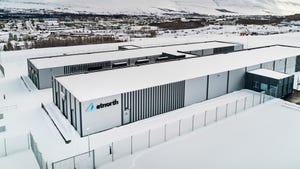Data Center News Roundup: Undersea Cable Cuts, AI Power Concerns
In this week's top data center news, undersea cable damage highlights global infrastructure weaknesses, and the industry focuses on the AI power dilemma.
March 15, 2024

With data center news moving faster than ever, we want to make it easy for industry professionals to cut through the noise and find the most important stories of the week.
The Data Center Knowledge News Roundup brings you the latest news and developments across the data center industry – from investments and mergers to security threats and industry trends.
To keep up to date with all things data centers, subscribe to the Data Center Knowledge newsletter to get content straight to your inbox.
Fractured Fiber
The recent spike in severed undersea cables has underscored the vulnerability of global infrastructure.
This week, eight West African countries were reported to have been affected by damage to four subsea cables, triggering outages and connectivity issues for mobile operators and internet service providers. The cause of the cable faults has not yet been determined.
The news came less than a month after three telecommunications cables were damaged in the Red Sea. The anchor of a cargo ship that was attacked by Houthi militants was suspected of being the likely cause of damage.
The problems with cables on either side of the continent created a capacity crunch, with customers of those cables scrambling to find alternative routes.
In an increasingly interconnected world, addressing the fragility of undersea cables is paramount for maintaining global connectivity and resilience.
It remains to be seen how governments, enterprises, and operators will unite to confront these enduring challenges.
AI Overload
Industry experts came together this week to discuss the snowballing challenges AI presents to power distribution within data centers.
During a webinar hosted by Data Center Knowledge, the swift and profound impact of AI on the data center industry was top-of-mind, with a focus on the challenges it presents to power distribution.
“AI is instantly everywhere at once,” said Christopher McLean, principal at Critical Facility Group, who noted that the growth of AI has been accompanied by an unprecedented increase in energy demand.
McLean was joined by John Berenbrok, director of product management at Starline, for a wide-ranging discussion that addressed some of the most pressing questions facing data centers in light of AI’s dominance.
Check out our coverage for all the details.
The discussion came as EQT Corporation, a natural gas producer, announced the surprise $5.5 billion acquisition of Equitrans Midstream Corporation, a pipeline business it spun out six years ago.
In a call on Monday, EQT CEO Toby Rice said the controversial Mountain Valley Pipeline, which is owned by Equitrans, will help meet rapidly growing power demand from artificial intelligence in the southeastern US.
EU AI Act
In related news, the European Union has passed its sweeping AI Act, which will establish tough guidelines (and potential penalties) for businesses using artificial intelligence.
As InformationWeek reports, the EU will roll out the new regulations in phases between 2024 and 2027 targeting “high-risk” AI applications. Companies running afoul of the new rules could face fines of up to 7% of global turnover, or $38 million, whichever is higher.
Discussing the changes in a blog post this week, Forrester analyst Enza Iannopollo said: “The EU AI Act is the world’s first and only set of binding requirements to mitigate AI risks. The goal is to enable institutions to exploit AI fully, in a safe, trustworthy, and inclusive manner.”
Check out our earlier coverage of the EU AI Act to find out what the legislation means for business leaders.
Global Data Center Developments
In data center construction and development news this week, cloud provider OVHcloud has announced the opening of its second data center in Canada.
Located in Cambridge, Ontario, the C$145 million ($107 million) facility has a capacity of 10,000 servers and 2 MW of power. It will be accessible to OVHcloud US customers and will purportedly deliver improved latency compared to the existing OVHcloud data center near Montreal and the OVHcloud data center in Vint Hill, Virginia.
Staying in Virginia, Skanska has signed a contact with an as-yet-unnamed client to build a data center in the eastern US state. The $242 million deal will herald the development of a 23,000 sq.m data center across three halls.
Elsewhere, Yondr Group has energised its first campus in Malaysia, marking a significant milestone in delivering the site’s power infrastructure.
Located in Johor’s Sedenak Tech Park, the campus is set to deliver 300 MW of critical IT capacity when fully complete. It will see the development of multiple phases, with access to dark fibre connectivity, scalable utilities, and infrastructure.
Over in the UK, Equinix has revealed plans to transform a former industrial site in Slough, 20 miles west of London, into a data centre campus. The consultation closes on 27 March.
Google has signed a new agreement to bring wind and solar energy to the local grid. Last year, construction started on the company’s first Arizona data center in Mesa, which will use air-cooled technology. Google has now announced an energy supply agreement to support more than 430 MW of new-to-the-grid, carbon-free energy capacity in the state.
“With this new agreement, we are not just offsetting our energy use, but also actively working to add carbon-free energy capacity directly to Arizona's grid when and where it's needed,” Google said.
Other Great Reads on DCK This Week
How the Groundwater Crisis May Impact Data Centers. Here's why groundwater availability is poised to play a larger role in shaping the industry – and what data centers owners can do to keep it from undercutting their infrastructure plans.
Japan’s NEC Weighing $500M Data Center Sale, Sources Say. The Tokyo-traded company is reportedly preparing a potential sale of the business.
Bare-Metal vs. Dedicated Servers: Different Names for the Same Thing? Unlock the mystery behind bare-metal vs. dedicated servers. Are they truly different, or is it just marketing spin? Dive in as we try to uncover the truth.
Master Cloud and Data Center Reconfiguration With an Open NOS. Open network operating systems are designed to make private data center networks and cloud environments easier to scale, adapt, and automate.
Hackers Roil Entire Industries With Attacks on IT Supply Chain. Cybersecurity experts say malicious hackers are finding new opportunities in the fast-evolving cloud landscape.
Read more about:
North AmericaAbout the Author
You May Also Like









